#Logistics Fleet
Text
Best Logistics Fleet Management Software
In the rapidly evolving world of logistics, effective fleet management is the key to success.
Whether you oversee a fleet of trucks, delivery trucks, or a combination of vehicles, having the right logistics fleet management software can be a game changer. These software solutions are designed to streamline operations, reduce costs and improve overall efficiency. In this article, we'll explore some of the best logistics fleet management software options available, each offering unique features to help businesses navigate the path to efficiency.

1. Geotab:
Geotab is a comprehensive fleet management software known for its real-time tracking, route optimization, and maintenance tracking. It's a versatile solution suitable for fleets of all sizes.
2. Samsara:
Samsara offers a robust fleet management platform with features like real-time GPS tracking, driver safety monitoring, and vehicle diagnostics.
It's a favorite among businesses looking to enhance safety and compliance.
3. Teletrac Navman:
Teletrac Navman provides fleet management software focused on real-time tracking, compliance and driver behavior monitoring.
This is the preferred choice for companies looking to improve driver performance and reduce fuel costs.
4. Fleet Complete:
Fleet Complete offers a comprehensive suite of fleet management tools, including GPS tracking, dispatching and asset management. It is highly adaptable and can cater to different industries.
5. KeepTruckin:
KeepTruckin is known for its user-friendly fleet management software. It offers features like electronic logging, IFTA reporting, and vehicle inspections, making it a great choice for small to medium fleets.
6. Verizon Connect:
Verizon Connect provides GPS fleet tracking software focused on route optimization, fuel management and field service automation. It is ideal for businesses looking to reduce costs and increase productivity.
7. Route4Me:
Route4Me offers advanced route optimization software, perfect for last-mile delivery operations. It offers real-time tracking, geolocation, and route planning capabilities, making it an essential tool for businesses delivering to customers.
8. WorkWave Route Manager:
WorkWave Route Manager is a cloud-based fleet management solution designed for mobile workforces. It offers route optimization, GPS tracking, and reporting, making it an ideal choice for delivery businesses.
Selecting the right logistics fleet management software is crucial for businesses seeking to stay competitive and efficient in the logistics industry. These software solutions cater to a wide range of needs, from real-time tracking and route optimization to driver safety and compliance.
As the logistics landscape continues to evolve, having the best fleet management software can put your business on the path to success.
5 notes
·
View notes
Text
in 'cool and unusual motorsport jobs' news, Mercedes F1 team are looking for an Environmental and Sustainability Manager, which needs specialist qualifications in UK environmental certification but which aren't the sort of thing that most F1 jobs ask for - could be a really awesome opportunity to work on implementing green technologies and developing environmental practices, if that's your field
#f1 teams do do some genuinely interesting things in terms of environmental management like optimising power use at factories#and eg: although it's not a perfect fix Merc saved a significant chunk of logistics CO2 by switching to biodiesel for its truck fleet#as well as the more esoteric stuff like McL working with carbonfibre alternatives to push forward non petrol compounds
33 notes
·
View notes
Photo

#this is what i believe in#sorta related i was reading an article a few weeks ago#where they discussed the idea of using dirigible drones to load and unload cargo ships off the coast#instead of waiting for them to enter port#at least partly#i just love airships and i'm hoping they make a comeback#also on a related note i'm just really excited to see how automation/robotics changes logistics#things are about to get really efficient#logistics have largely been the same for like a century#we're about to witness a supply chain revolution#and at all levels of the supply chain#just imagine#autonomous cargo ships unloading at autonomous ports#ships waiting in line are unloaded by drones#then fleets of autonomous trucks#and revitalized trains#then smaller drones to directly deliver packages from stores/warehouses to consumers
5 notes
·
View notes
Text
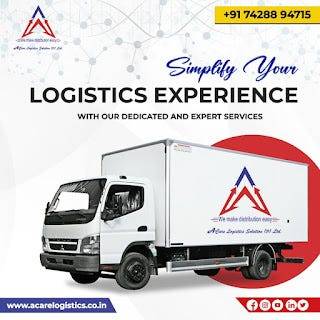
Current business climate requires fleet management to be effective especially for organizations that involve themselves in transportation and supply chain. Being one of the leading fleet management service providers, Acare Logistics has developed a set of services with the purpose to meet all your fleet management needs, minimize your expenses and improve your functionality. Being experienced in working with different kinds of fleets of different industries, we provide the best solutions for any transportations you may need.
Importance of Fleet Management
Fleet management has been defined as the process of managing a company’s vehicle to achieve its intended function effectively. It comprises everything from car maintenance and tracking of routes to handling and fuel control. Fleet management has great potential to help to decrease specific costs when operating the vehicles and to increase customer satisfaction while noting the presence of regulatory obligations.
Our service at Acare Logistics is unique because we assess the needs of your business and come up with the best solution for fleet management. This means no matter big or small your company is, with our services you not only are able to conduct your operations smoothly but also are able to generate the optimum amount of profit.
Pan India Transport Service: Interconnecting the Businesses All Across the Nation
During the evolution of the businesses and their growth, the requirement for the appropriate means of transport becomes more tangible. Acare Logistics is a company that provides Pan India transport solutions to the companies located throughout the country to transport goods securely and on time. This has have helped us to have a large network as well as a large fleet of properly maintained vehicles used to meet your requirements.
For your domestic transport needs, whether it involves transporting goods over long distances or the final mile, our Pan India transport services a suitable for different industry. We boast of our ability to overcome specious logistic conundrums and to deliver efficient transportation services that ensure your chain of supply is not interrupted.
Why Acare Logistics for Pan India Transport Services?
1. Nationwide Coverage: We have insisted on having our centres in all the major cities and regions of India; thus, guaranteeing your goods safe and timely delivery.
2. Reliable Fleet: We provide our clients merit worthy and good condition vehicles that are equipped with technology and well maintained.
3. Experienced Team: We are a team comprised of highly qualified experts who’s main goal is to deliver unparalleled quality services in regard to your transportation requirements.
4. Flexible Solutions: Our transportation services are flexible, which allows us to develop specific solutions that can be implemented in your business.
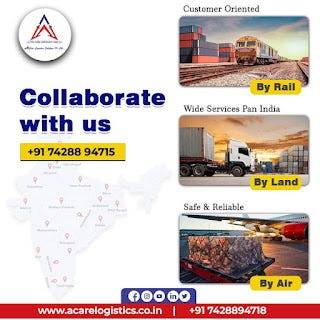
Integrated Supply Chain Management: Streamlining Your Operations for Maximum Efficiency
In today’s highly competitive business environment, the supply chain management has become a core competency that most enterprises consider crucial to competing effectively in the market. Acare Logistics provides a complete solution of supply chain management services for your processing needs that make your processes more efficient, cost effective and effective. Every aspect of the supply chain, including but not limited to the sourcing of materials, manufacturing, inventory, shipping and delivery, are handled by our end-to-end solutions.
Advantages of Integrated Supply Chain Management
Supply chain integration focuses on integration of all aspects of the supply chain from suppliers to manufacturers, distributors and retailers to form a harmonized system. Through the incorporation of these elements, firms are in a position to cut on lead time, decrease on inventory costs, better customer satisfaction and improve the firms’ competitiveness.
As Acare Logistics, we offer supply chain solution services that meet the needs of your business by employing a professional approach. This integrated method guarantees that each component in your supply chain is well coordinated and in this way, your supply chain is characterized by high flexibility.
Why Acare Logistics for Integrated Supply Chain Management?
Comprehensive Solutions: Supply chain management services consist of sourcing and procurement, order and transportation and distribution and delivery.
Expertise and Experience: Our skilled group of supply chain specialists provides clients with information accumulated in years of experience in the field.
Customized Approach: This means that in handling their finances we understand that every business is special and has its characteristics. Our solutions will suit the needs of your supply chain since we’re developed uniquely for your needs.
Technology-Driven: We employ the innovations of technology and the analysis of data to help in the enhancement of your supply chain.

Conclusion
Acare Logistics is one of the premier fleet management service providers that offers excellent transportation and supply chain solutions based on the current demands of the organizations in India. From Pan India transport solutions to end-to-end supply chain solutions, we’ve got what it takes to make your business thrive.
Choose Acare Logistics as your partner for logistics today and see how professional and thorough services can impact positively on your enterprise. Get in touch with us, about our services and how we can assist you to achieve your operational requirements.
#acarelogistics#logistics#logisticscompany#logisticssolutions#supplychain#supplychainmanagement#Fleet Management Service Provider#pan india transport service#intergrated supply chain management
0 notes
Text
Top Trucking Industry Trends of 2024: Adapting to a New Era of Innovation and Challenges
The trucking industry is experiencing significant changes, driven by advancements in technology, economic pressures, and environmental concerns. One of the biggest trends is the adoption of electric trucks. Many companies are feeling the push to reduce carbon emissions and meet sustainability goals. Electric trucks, while expensive upfront, are being seen as long-term investments due to lower…

View On WordPress
#AI in trucking#alternative fuels#autonomous trucks#business#cash flow management#driver retention#driver shortage#Electric Trucks#electric vehicles#fleet management#fleet safety#Freight#freight industry#freight management#Freight Revenue Consultants#fuel optimization#gig economy drivers#logistics#logistics technology#rising fuel costs#small carriers#smart trucks#sustainability in trucking#Transportation#Trucking#trucking analytics#trucking automation#trucking cybersecurity#trucking data#trucking industry
0 notes
Text
Immense Trucking Solutions Ltd: Exploring the Advantages of Rental Trucks for Small Businesses
For small businesses, effective logistics, and transportation are critical to success. One of the most practical and versatile options available is utilizing rental trucks. This approach not only offers flexibility but also provides tailored trucking solutions to meet specific business needs. Here are some key advantages of opting for rental trucks:

Cost-Effectiveness: Rental trucks can significantly reduce overhead costs associated with owning a fleet. Small businesses can save on maintenance, insurance, and depreciation by choosing rental options instead. It is for those who experience fluctuating transportation demands.
Flexible Trucking Solutions: Renting trucks allows small businesses to select the vehicle size and type based on their current needs. Whether for a one-time delivery or a seasonal spike in demand, that can adapt quickly without the long-term commitment of purchasing a truck.
Dedicated Trucking Solutions: Businesses can depend on a specific vehicle for regular shipments, ensuring reliability without the hassle of ownership.
Access to Modern Fleet: Rental companies often maintain a fleet of newer models with the latest technology and safety features. This access to modern trucks can enhance operational efficiency and safety, providing businesses with peace of mind during transport.
Scalability: As small businesses grow, so do their shipping needs. Rental trucks offer the scalability required to expand their logistics operations seamlessly. Companies can efficiently increase or decrease their rental agreements based on seasonal demands, helping to streamline their logistics strategy.
Time-Saving Convenience: Rental services often provide quick and easy access to vehicles, allowing businesses to get on the road faster. This convenience can be crucial for time-sensitive deliveries, enhancing overall customer satisfaction.
Reduced Administrative Burden: By choosing rental trucks, small businesses can reduce the administrative tasks associated with fleet management, such as maintenance scheduling and compliance checks. It allows them to focus more on core business activities and logistics management.
In conclusion, rental trucks present a flexible and cost-effective solution for small businesses looking to optimize their transportation logistics. With access to dedicated trucking solutions and the advantage of scalability, companies can meet their delivery needs efficiently while keeping costs manageable. Embracing rental trucks can improve operational efficiency and a dynamic in the marketplace.
#Administrative#immense trucking solutions ltd#trucking industry#trucking solutions#Modern Fleet#Small Businesses#management#logistics#dedicated trucking solutions
0 notes
Text
Real-Time Tracking Solutions for Smarter Logistics Management

In the hectic contemporary logistics, the need for efficiency and transparency has never been greater. Businesses are continually seeking ways to function more efficiently, save costs, and increase customer satisfaction by means of effectiveness. Now add real-time tracking solutions in corporate logistics management, this trend has transformed the area.
Artificial intelligence (AI) and the Internet of Things (IoT) provide formerly unheard-of access and control over the full supply chain. Therefore, in this article, you’ll learn everything about real-time tracking in modern logistics.
What are real-time tracking solutions in logistics?
Real-time tracking systems are technologies enabling businesses in the context of logistics to continuously monitor the movement and condition of products all along the supply chain. These systems provide consistent, current data on cargo location, condition, and projected arrival timings by combining GPS tracking, IoT sensors, artificial intelligence algorithms, and cloud-based platforms.
Whether they track a fleet of cars, monitor warehouse inventory, or assure cold chain integrity, real-time tracking solutions in logistics provide managers with the information they need to make quick decisions. This level of visibility is very essential in the internationally connected economy of today as errors or delays might have significant financial effects.
Benefits of real-time tracking systems

Applied in logistics, real-time tracking solutions offer several advantages allowing more intelligent logistics management:
1. Better visibility and openness
Real-time monitoring provides unrivaled visibility into the complete logistics supply chain. This transparency allows logistics managers to identify assets, track shipments, and precisely regulate inventories. Knowing exactly where items are at any one moment enables businesses to ensure timely delivery, reduce the risk of lost or stolen products, and alert customers.
2. Improved Efficiency and Productivity
Real-time tracking systems provide meaningful data and automate tedious tasks, therefore simplifying logistical procedures. Artificial intelligence (AI) based fleet management solutions, for instance, may maximize delivery routes, therefore reducing fuel consumption and trip times. By enabling real-time stock level monitoring made possible by warehouse tracking systems, one reduces the likelihood of stockouts or overstocking and aids to automatically restocking.
3. Financial Cutbacks
By simplifying processes, reducing idle time, and avoiding inventory losses, real-time tracking solutions may significantly minimize operational expenses. One can help to further lower costs by replacing expensive on-site infrastructure with cloud-based logistics solutions in Australia. Real-time data lets businesses also quickly identify inefficiencies and implement remedies, therefore lowering long-term expenses.
4. Enhanced Contentment of Customers
Online shoppers of today need fast, consistent delivery. Real-time order monitoring and correct shipment estimates enable businesses to meet these goals. Usually improving the customer experience, this degree of transparency helps to develop trust.
Key components of real-time monitoring
Analyzing the key components of real-time tracking solutions will enable one to fully understand their impacts:
1. GPS tracking
GPS tracking in logistics is the foundation for all sorts of real-time monitoring devices. It gives accurate current position of the assets, cargoes, and vehicles as desired by our client. Fleet management solutions with GPS tracking units installed are employed widely in order to control vehicle actions, circulation, and confirmation of delivery punctuality.
2. IoT in Chain Management
Real-time tracking mainly relies on the Internet of Things (IoT) app development that links digital environments to real objects. Sensors for IoT, which gather location, temperature, humidity, and any other related information, are mounted on goods, cars, and machines. After that, this data is transferred to cloud-based logistic systems for analysis and application direction of influence, directing direct decisions.
3. AI Solution for Lite Supervision
Using data and a highly significant number of prediction figures, AI solutions for real-time tracking can possibly augment tangible real-time monitoring systems. AI development in Australia can bring out patterns, estimate probable time lags, and suggest appropriate inventory or the path of action.
4. Cloud logistics platform
More central on cloud-based logistics platforms are real-time tracking systems. These systems collect data from various origins such as smart devices, geographic position systems, as well as artificial intelligence arrangements, then display in a clear manner. Real-time information from any place is invaluable to logistics managers when they make decisions.
5. Mobile App Development
Indeed, given the fact that real-time tracking solutions give urgent access to the necessary logistical information, the last ordinarily rely on mobile application development in Australia. Most logistic managers may track shipments, communicate with drivers, and manage stock through their tablets or smartphones using mobile apps.
Applications in contemporary logistics for real-time tracking
As used in a variety of subfields of the logistics sector, real-time monitoring presents different difficulties and expectations based on its application.
1. Fleet management
One of the most common applications of real-time tracking solutions is the use of fleet management solutions. Organizations monitor vehicle movements, optimize paths, and reduce fuel consumption through GPS logistics tracking systems. In addition, increasing asset durability and reducing the time the vehicle is out of use is the ability of real-time data to suggest preventive measures.
2. Warehouse Inventory Management
Real-time tracking systems undoubtedly depict what constitutes good warehouse inventory management. These systems are designed to replace replenishment, order status, and detect the motion of warehoused products. AI-based warehouse management solutions also prevent the likelihood of stock out or having excess inventory through demand forecasting and inventory levels.
3. Cold Chain Logistics monitoring
Real-time monitoring systems are effective in cold chain logistics, where products must be kept within specific temperatures. IoT sensors provide live updates on temperature, humidity, and other factors to ensure the best quality of food, drugs, and other fragile goods.
4. Supply Chain Management
These technologies start from the producer level and extend to the end-user, providing end-to-end information that helps businesses organize the monitoring of their goods. This awareness often enables businesses to identify gaps in the supply chain, allowing them to recognize issues like inventory positioning and bottlenecks.
Real-time tracking in logistics – the future
The development and future of logistics technology will be mainly governed by the perpetual advancement of real-time tracking technology. With the evolution of AI, IoT, and cloud computing technologies, and experiences, we expect to see more enhanced real-time tracking in logistics having higher accuracy, predictive ability, and automation in the forthcoming tracking system generations.
App integration services by SSTech Logistics Solutions manage the bulk product, type of vehicle used, online booking tracking system, and estimated time and cost of delivery to meet the increasing demand for efficient supply chain logistics.
IoT in supply chain management will continue to advance as more items and resources connected to the network generate more data and higher-quality information.
Conclusion
Today’s smart logistics management involves the use of real-time tracking systems as these offer the best supply chain management solutions. The logistics industry in Australia will be compelled to become customer-oriented, less costly, and adjust to accommodate new technologies embraced by companies that use them. Applying all of them at present means they can expand within the extremely competitive global environment.
#sstechsystem#sstech system#webdevelopment#appsdevelopment#appdevelopment#india#business#australia#b2b#AI Development#AI#ai framework#flutter#chatgpt#logistics industry in Australia#smart logistics management#SSTech Logistics Solutions#IoT#Supply Chain Management#Real-time tracking in logistics#Real-time tracking#Cold Chain Logistics#Warehouse Inventory Management#Mobile App Development#Fleet management#GPS logistics tracking#AI Solution#warehouse tracking systems
1 note
·
View note
Text
Eld Compliance Software - All-Ways Track
With a full feature set to improve your operations, All-Ways Track is the best option for your transportation business. Our sophisticated Eld Compliance Software is part of our tried-and-true software, which is supported by years of experience, to guarantee that your fleet complies with regulations with ease. With features like real-time tracking, maintenance management, and user-friendly reporting, we offer all you need to maximize fleet efficiency and performance. Our powerful technology is made to help your business expand and provide you with the advantages you need to stay ahead in a cutthroat market. For an all-in-one solution that turns your solid operations into outstanding accomplishments, go with All-Ways Track.

#Eld Compliance Software#Fleet Maintenance Software#Driver Dispatch Software#Compliance Management Software#Logistics Invoicing Solution
0 notes
Text
youtube
#youtube#militarytraining#usmilitary#Fleet Logistics Center Yokosuka#Change of Command Ceremony#Yokosuka#Change of Command#Highlights#Japan#Logistics Center#Yokosuka Ceremony#Navy Logistics#Navy Ceremony#Military#Navy#US Navy#US Military#Yokosuka Japan.#Naval Base#Command#Ceremony#NAVSUP#Military Ceremony
0 notes
Link
Simplify your trucking business with Bolt Truckin's efficient dispatch system. We optimize your operations for maximum productivity.
0 notes
Text
Dark fleets and Sanctions
We now have two worlds of international commerce, as a result of trade wars and the Ukraine-Russia conflict. As the Western world, principally the EU, UK and related countries and the US look to tighten sanctions on Russian oil exports, some shipowners are finding creative ways to get around the rules set by the West.
One important escape hatch is to flag ships with a Flag State that doesn’t…
#Cook Islands Flag State#Cook Islands top 30 Flag State#dark fleet#Dubai shadow gas carrier fleet#environmental provisions#Flag State#Indian oil imports#international commerce#LNG shadow fleet#logistical constraints#Russian crude oil#Russian oil exports#Russian oil trade#safety provisions#sanctioned oil#ship-to-ship transfers#shipowners#substandard ships#Ukraine-Russia conflict#Western sanctions
0 notes
Text
Understanding Taabi's AI-Driven Approach to Operational Efficiency
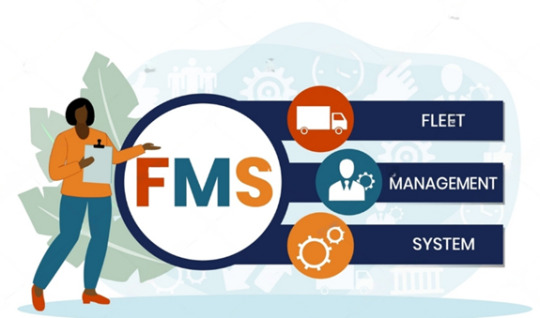
In today's fast-paced business landscape, operational efficiency is critical for success. Companies are continually seeking innovative solutions to streamline processes, reduce costs, and improve overall performance. Taabi, a leading provider of SaaS platforms, leverages artificial intelligence (AI) to enhance operational efficiency across various industries. This article explores how Taabi's AI-driven approach can transform businesses, focusing on its core features, benefits, and real-world applications.
The Power of AI in Business Operations
Artificial intelligence is revolutionizing commercial operations. Artificial intelligence (AI) systems are capable of analyzing vast amounts of data, projecting outcomes, and providing insightful advice. Taabi's fleet management system monitors operations in real-time using advanced algorithms, enabling companies to take prompt, decisive action. In addition to boosting productivity, this ability enables firms to identify issues early on and take appropriate action to keep them from getting worse. As a result, businesses can maintain a competitive edge and adeptly adapt to changing market demands.
Real-Time Monitoring for Enhanced Decision-Making
One of the key components of Taabi's AI-driven strategy is real-time monitoring. Taabi provides businesses with valuable information about their processes by continuously monitoring key operational data. The platform monitors several aspects such as fuel management system, vehicle health, cargo data, and driver behavior. Thanks to this real-time data, organizations can identify inefficiencies and quickly address them. Taabi's solutions can help businesses increase overall performance, reduce downtime, and streamline processes.

Predictive Analytics for Proactive Problem-Solving
Taabi's AI system employs predictive analytics in addition to real-time monitoring to foresee potential operational issues. Taabi uses historical data and patterns to predict when a vehicle may require maintenance or when a supply chain disruption may occur. This proactive approach enables businesses to take preventive action, which ultimately reduces the costs associated with unanticipated delays or breakdowns, including those related to a fuel monitoring system. Predictive analytics can assist organizations in enhancing their operational strategy and optimizing resource allocation.
Enhancing Fuel Efficiency with AI Insights
Fuel costs significantly impact a company's bottom line, particularly in industries that deal with transportation. Businesses can utilize Taabi's AI-driven solutions to examine fuel usage trends and find opportunities for improvement. Taabi analyses data from a logistics management system’s route, vehicle performance, and driver behavior to provide insights into fuel efficiency. To reduce fuel consumption, businesses may employ strategies like route optimization or encouraging drivers to adopt more fuel-efficient driving practices. This allows organizations to support environmental projects while also saving a substantial amount of money.

Improving Vehicle Health Monitoring
Vehicle health monitoring is a crucial component of Taabi's operational efficiency solutions. The platform continuously evaluates the state of the cars, giving real-time information about maintenance requirements. Businesses may take care of possible problems with this capacity before they become more serious and require expensive repairs or downtime. Taabi may use AI to examine a variety of data points, including wear and tear and engine performance, to identify the best maintenance schedule. By taking a proactive approach to vehicle health management, companies may increase asset lifespan and maximize uptime.
Optimizing Driver Behavior for Safety and Efficiency
The way drivers behave has a significant effect on security and operational performance. Taabi offers AI-driven solutions that include tools for monitoring driver behavior. Taabi monitors elements like as acceleration tendencies, hard braking, and speeding to provide drivers with relevant feedback. You may reduce your fuel consumption, improve your general safety, and improve your driving techniques by using this knowledge. Furthermore, companies can implement training programs based on Taabi's research findings to foster an efficient and safe work environment among their employees.
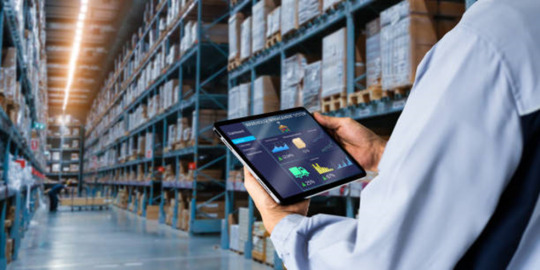
Streamlining Cargo Management
Logistics and transportation-related organizations need to have efficient cargo management. Taabi's products enable real-time cargo tracking, enabling companies to keep an eye on their shipments through the supply chain. Taabi can examine a range of variables that affect cargo management, including delivery schedules and route efficiency, by utilizing AI technology. With the use of this capacity, businesses may improve customer satisfaction, cut down on delays, and streamline their logistics procedures. Simplified cargo management boosts operational effectiveness and has a big effect on a business's standing in the industry.
Data-Driven Decision-Making
The significance of data-driven decision-making is emphasized by Taabi's AI-driven methodology. Efficient data analysis and interpretation are essential in an era of plentiful information. Taabi's solutions give organizations insights that may be put to use through thorough data analysis. Taabi improves operational strategies by enabling firms to make well-informed decisions based on real-time data. By promoting a culture of continuous improvement, this data-driven strategy helps organizations stay flexible in a cutthroat market and adjust to changing conditions.
Customization and Scalability
Taabi's products are notable for their exceptional scalability and customization capabilities. Taabi offers customized solutions since it understands that every organization has different operational needs. Businesses may alter the platform to meet their unique needs and make sure they get the most out of the technology. Furthermore, Taabi's solutions are scalable, enabling companies to grow and enhance their capabilities. Taabi is a desirable choice for businesses of all kinds, from start-ups to well-established corporations, due to its versatility.
Integrating IoT for Comprehensive Monitoring
The Internet of Things is further strengthened by Taabi's AI-driven approach (IoT). Taabi can collect real-time data from several sources and provide a comprehensive view of operations by linking different devices and sensors. Businesses can find inefficiencies in every aspect of their operations, from driver conduct to vehicle performance, thanks to this thorough monitoring. AI and IoT work together to produce a potent synergy that enables businesses to streamline their operations and raise overall productivity.
Businesses may enhance their operations using Taabi's all-inclusive process optimization solution, which is powered by AI. Utilizing data-driven insights, predictive analytics, and real-time monitoring, firms may boost efficiency, cut expenses, and perform better all around. Taabi's emphasis on scalability and customization guarantees that its products may be modified to satisfy the particular requirements of every company. Taabi stands out as a leader in offering cutting-edge, AI-powered solutions that propel success in today's competitive landscape as the demand for operational efficiency rises. Using Taabi's technology can help companies prosper and change with the times in a dynamic marketplace.
#fleet management system#fuel management system#fuel monitoring system#Logistics management system#transportation management system#driver behavior monitoring#vehicle health monitoring system
0 notes
Link
Ryder System, Inc. (NYSE: R) is a leading logistics and transportation company. It provides supply chain, dedicated transportation, and commercial fleet
#logistics #Supplychain @RyderSystemInc
0 notes
Text

Discover SSL, a premier Employee Transportation and Fleet Management company in Hyderabad. Established in 2013, aiming to become the largest PAN India People Logistics player.
#Shyam Salasar Logistic Solutions#SSLPL#Employee Transportation Company in Hyderabad#Fleet Management Hyderabad#People Logistics#PAN India Employee Transport#Corporate Transport Services.
0 notes
Text
The Cost of Ignoring Professional Advice in the Trucking Industry
Running a trucking business isn’t just about owning a bunch of trucks and hiring drivers. It’s a tough industry filled with rules, rising expenses, and new technologies popping up all the time. To keep up, you need more than just hard work—you need expert advice. Unfortunately, many trucking companies skip out on this, thinking they can handle it on their own. The truth is, that decision can cost…

View On WordPress
#avoid trucking penalties#business#cash flow management#driver retention#driver satisfaction#financial stability in trucking#fleet management#Freight#freight industry#Freight Revenue Consultants#logistics#professional advice#regulatory compliance#small carriers#Transportation#truck fleet optimization#Trucking#Trucking business#trucking business growth#trucking business strategy#trucking company success#trucking compliance#trucking consultancy#trucking consultant benefits#trucking consultants#trucking efficiency#Trucking Financial Management#trucking growth strategies#trucking industry#trucking industry challenges
0 notes
Text
The Future of Fleet Management: Trends and Innovations Shaping the Road
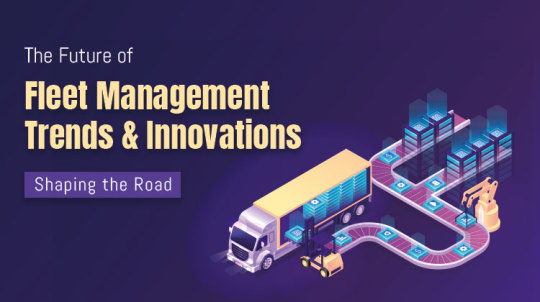
The logistics industry, often referred to as the lifeblood of our global economy, orchestrates the seamless movement of goods across vast distances. From delivering groceries to medical supplies, it ensures that businesses thrive, and societies function smoothly. Yet, at the core of this intricate system lies a critical component: fleet management.
Traditionally, fleet managers relied on clipboards, spreadsheets, and a fair share of guesswork. But today, a seismic shift is underway—a transformation fuelled by cutting-edge technology. Buckle up, because the future of fleet management promises to be a high-speed ride, and its IT professionals, entrepreneurs, and logistics experts who will be at the wheel.
In this blog series, we’ll delve into the dynamic landscape of fleet management, exploring trends, innovations, and strategies that drive efficiency, safety, and sustainability. From optimizing routes to embracing electric vehicles, we’ll navigate the twists and turns of this industry’s evolution.
The Power of Data: Fleet Management Systems Take Centre Stage
Fleet management systems (FMS) have become the undisputed champions, offering a centralized platform to track vehicles, optimize routes, and analyse driver behaviour. These robust software solutions leverage real-time data, providing a bird’s-eye view of your entire fleet operation. Imagine being able to pinpoint the location of every vehicle, monitor fuel efficiency, and identify potential maintenance issues – all from a single, user-friendly interface.
Telematics: The Language of Connected Fleets
The magic behind the FMS curtain lies in telematics – the technology that collects and transmits data from your vehicles. Think GPS tracking on steroids. Telematics systems gather a wealth of information, including:
Vehicle location and status: Know exactly where each vehicle is, whether it’s idling, moving, or parked.
Driver behaviour: Monitor speed, braking patterns, and harsh acceleration to identify areas for improvement and promote safety.
Fuel consumption: Gain valuable insights into fuel efficiency and identify opportunities to optimize routes and reduce costs.
Engine diagnostics: Get real-time alerts on potential mechanical issues, allowing for preventive maintenance and avoiding costly breakdowns.
By harnessing the power of telematics, FMS empowers fleet managers to make data-driven decisions that enhance efficiency, improve safety, and ultimately, boost the bottom line.
The Rise of the Machines: AI and Machine Learning
Get ready to be amazed by the next wave of innovation: Artificial Intelligence (AI) and Machine Learning (ML) are poised to revolutionize the way fleets operate. Here’s a glimpse into what the future holds:
Predictive maintenance: Imagine a world where your vehicles can predict their own maintenance needs! AI algorithms will analyse data to anticipate potential problems before they occur, preventing costly breakdowns and ensuring peak performance.
Advanced route optimization: ML will take route planning to a whole new level. By factoring in real-time traffic data, weather conditions, and historical patterns, AI can create the most efficient and time-saving routes possible, reducing fuel consumption and delivery times.
Driver coaching: AI can analyse driver behaviour patterns and provide personalized feedback, promoting safe driving habits and minimizing risks.
The integration of AI and ML into fleet management systems will lead to a future where fleets operate with unprecedented levels of efficiency and intelligence.
Electric Vehicles and Sustainable Logistics
Sustainability is no longer a buzzword; it’s a driving force in the logistics industry. The rise of electric vehicles (EVs) presents a game-changing opportunity for fleets to reduce their environmental footprint. Imagine a fleet of silent, zero-emission delivery trucks gliding through city streets – that’s the future we’re building towards.
However, Fleet management systems will need to evolve to accommodate charging infrastructure, monitor battery health, and optimize routes for maximum range. This presents exciting opportunities for IT professionals and logistics application developers to create the next generation of fleet management solutions that are both efficient and environmentally friendly.
The Human Touch: Collaboration is Key
While technology plays a critical role, it’s important to remember that the human element remains vital in fleet management. The best fleet management systems empower drivers and fleet managers to work together seamlessly.
Imagine a future where drivers receive real-time updates on traffic conditions and optimized routes, allowing them to deliver goods safely and efficiently. Additionally, fleet managers can leverage data from the FMS to provide targeted coaching and feedback to drivers, fostering a collaborative environment that prioritizes safety and performance.
The Road Ahead: A Connected, Efficient, and Sustainable Future
The future of fleet management is a connected one. Vehicles, drivers, and fleet managers will be seamlessly integrated through a network of data and intelligent systems. This interconnected ecosystem will lead to:
Increased efficiency: Optimized routes, proactive maintenance, and improved fuel management will lead to significant cost reductions and streamlined operations.
Enhanced safety: Real-time driver monitoring, and personalized coaching will create a culture of safety on the road, reducing accidents and protecting lives.
Sustainability: The integration of EVs and eco-friendly practices will minimize environmental impact, creating a cleaner and greener future.
The future of fleet management is on the horizon, a landscape shaped by data, AI, and sustainable practices. As we embrace automation and data-driven insights, The road ahead demands not just technological advancements, but also a commitment to responsible innovation that prioritizes both efficiency and the well-being of drivers and the environment.
Let’s keep the conversation going. Share your thoughts on the future of fleet management in the comments below!
________________________________
Why is fleet management important?
It helps reduce costs, improve safety, enhance productivity, and ensure regulatory compliance.
How is technology changing fleet management?
Technology improves data collection, real-time monitoring, and predictive analytics, enhancing decision-making and efficiency.
Why are electric vehicles (EVs) important for fleet management?
EVs reduce emissions, lower fuel costs, and offer long-term savings and sustainability benefits.
How does predictive maintenance benefit fleet management?
It reduces downtime, lowers maintenance costs, and extends vehicle lifespan.
What role does AI play in fleet management?
AI enhances route optimization, predictive maintenance, driver safety, and overall fleet efficiency.
What is the future of fleet management?
The future includes more automation, increased use of AI, greater sustainability efforts, and improved data integration.
________________________________
Please Checkout the blog post: https://shorturl.at/qW8MI
#fleet management#fleet management systems#logistics application developers#fleet management solutions#fleet management software
0 notes